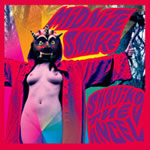|
|
 |
Dusted Reviews
Artist: Midnite Snake Album: Shaving the Angel Label: Birdman Review date: Oct. 9, 2007 |

|
|
|
 |
Midnite Snake makes assaulting, cathartic rock and roll, boiling out in squawks and bursts and screeching squalls of feedback, coalescing into monstrous slow riffs, then dissolving again into the heat and haze of distortion. Remember the first couple of Comets on Fire records, when you felt like you were being pummeled to death by guitars and yet you couldn't quite hear them clearly no matter how loud you turned things up? Same thing, this time from Pittsburgh, this time putting a krautish vibe in place of Comets’ amp-manipulated hippie spirit. Get ready, get earplugs. These guys will roll over you like a panzer tank and squash you like a bug.
The guys in question are, most notably, Paul Quattrone, the drummer from the Modey Lemon, plus guitarist Alexei Plotnicov and bass player Jim Lingo. That's right, just three of them. Someday, someone will do an EMP paper on why the loudest bands on earth are all three pieces. You'd think you could make more noise with four people or five, but in fact, you cannot. You cannot, at least, make more noise than Midnite Snake makes on five out of six tracks on Shaving the Angel. (A change-of-pace acoustic track called "In the Grass" provides brief rest and respite; it is okay, but nothing special.) Just three people – one banging the skins off a massive drum set, another conjuring deep space squalls and ritual thunder from a guitar, a third muttering and grinding away at a bass you can more feel than hear – but it sounds like an army of ogres.
The album opens with the Teutonic beat of "Cruise Control,” a pushed-pace, mechanical pulse underneath, an array of machine sounds and stretched out feedback over the top. The rhythm is propulsive, almost inhuman, intermittently buried under the more organic, free-form turmoil of guitar and bass. About two and a half minutes in, Plotnicov breaks out the big riffs, a strident rock statement in the midst of more abstract improvisation. But mostly it's the interplay of metronome steady, industrial beat and frizzed out, freakery, chaos spilling over geometrically precise lines. It's impressive, but only an inkling of what's coming; things get really intense when the drummer lets loose and there are no underpinnings at all. It's only really with "Bigfoot '69" that you start to recognize that machine-gun fire, double-quadruple bursts of percussion that Quattrone used in the Modey Lemon (parts of Thunder and Lightning seem like they're all drums, all the time). Here Lingo is the steadying influence, Quattrone setting off firecracker bursts and surges of snare around him. The title track has the same sort of headlong motion, flurries of free jazz improvisation giving way to monolithic power riffs.
Everything leads, though, to the final track, a 26-minute-long composition that starts ritually slow and heavy, a dirge lit only by phosphorescent arcs of feedback. It continues at that measured pace, goes on and on, but somehow tips near the middle, so that the bright altered tones take over and it feels like a celebration, rather than a funeral. It's too much in every way – too loud, too long, too crowded with overlapping sounds, too overwhelming – and yet, it's the best thing on a very strong album.
So let's hear it for excess, muddy production and guitars too deafening to really hear. Comets on Fire isn't doing this stuff anymore, which makes all the more room for Midnite Snake.
By Jennifer Kelly
|







